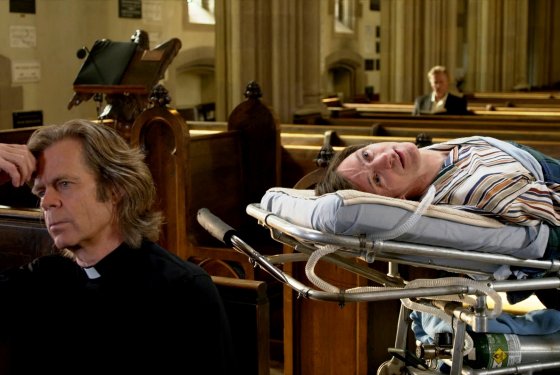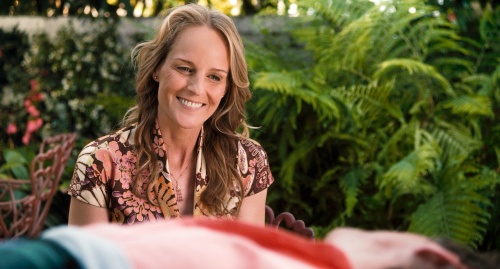|
The Sessions is based
on the life of journalist Mark O'Brien, adapting his article 'On Seeing
a Sex
Surrogate' (1990). Mark (played by John Hawkes) suffered from polio as
a child.
He is not so much paralysed but has a muscle disorder from the neck
down, which
makes his body immobile. At thirty-eight, he has spent his life either
on a gurney
board, with a portable respirator, or inside an iron lung, a large
machine that
provides him with oxygen. Simply, Mark is a virgin and due to the
immovability
of his neck, he hasn't been able to see his genitalia in thirty years.
Embarrassed by his inexperience and his slender body, Mark seeks help
from one
of his carers Vera (Moon Bloodgood) and also a new priest in Father
Brendan
(William H. Macy) in confronting the issue. He asks Father Brendan for
a
blessing to explore his own sexuality, while Vera wheels him to
meetings with a
sex surrogate. The surrogate is there to provide sexual activity with a
patient
for therapeutic purposes. Mark's sex surrogate is Cheryl (Helen Hunt),
who is
extremely dogmatic, telling him that they can only have up to six
sessions, and
being extremely closed about her own personal life. She's aware that
Mark's
anxiety stems from his personal demons, including the death of his
sister Karen
at age seven. Cheryl's own life is plagued by indecision: she is caught
in a
loveless marriage because her husband is a disinterested layabout,
sparking her
admiration for someone as intelligent as Mark.

This deceptively small film remains entirely selfless about its own
significance, but subtly envisions the great socio-political change
within
Hollywood and America cinema itself. Under more a liberal
administration, Hollywood's
attitude to sex, the most dangerous word in the American vocabulary,
has become
increasingly flexible and open-minded. The films being produced are now
more
frank and less conservative about sex and sexuality. The significance
of this
cultural change is that it evokes an equally changing national
identity. Americans are often caricatured as God-fearing
conservatives, when more accurately America was a nation built on
strict
Christian values. Some parts of America have retained this conservative
outlook, while others are pushing towards liberalism and broader
cultural
understanding of other races and religions.
Films that speak more
openly about
sex and gender will help shape American values and identities. Recent
films,
like Easy A (2010) and Friends With
Benefits (2011), have
approached the subject of sex through comedy, which makes it more
disarming and
accessible for a broader audience. Earlier this year Shame
turned the physicality of sex into a dramatic examination of
psychological behaviour. The Sessions
does the same, but it is not as intimidating or bleak a film. The sex
is
upfront, both physical and in verbal descriptions, and the actors
aren't
concealed. But the film is surprisingly funny and hopeful, not dour,
bravely
suggesting that physical connections are a means of liberating the
soul. Much
of the film's sincerity and honesty is drawn from real life sources,
which
enhances its authenticity. The film's director, Polish-Australian Ben
Lewin, was
affected by polio too, which makes him understandably sympathetic to
the story.
But wisely, the film closely traces O'Brien's article so that it's
never
overinflated with implausible melodrama.

There's
a level of gentility to the film, expressed most earnestly through the
performances. They're wonderful. John Hawkes, an underappreciated
character
actor, is the film's centrepiece and unfazed by the unconventional
physicality
of the part. He effortless draws O'Brien with a sense of humour and dry
wit,
but also projects a great amount of fear within this man as well. If you find yourself awkwardly tilting your
head during any close up shots, listen to the pitch of his voice and
the way
that he expresses his hesitation and his sense of dread in confronting
his body
and his own self-worth. For O'Brien, sex must become more than a
compulsive
life event. It is a means of understanding that he is an ordinary human
being.
Mark reflected on this in his article: "Another
lesson learned: Sex is
a part of
ordinary living, not an activity reserved for gods, goddesses, and rock
stars." But this is also a man who must also be at peace with
himself, replacing his emotions and guilt over his sister Karen with a
new form
of intimacy.
The complexity of this role is further echoed in its
relationship
to Hunt's work too. Her dialogue has a different set of rhythms.
Whereas Mark
is nervous and unassured, Cheryl is direct and rigid in her actions and
procedures. She is also very delicate and poised around her patients,
which is a
means of hiding her personal life. A once maligned actress, Helen Hunt
eases
into this role with such confidence and unflinching maturity, allowing
the
subtleties and minute features of her character to seem like the most
naturalistic
features of a real person. Her increasing attachment to Mark,
contrasted by her
unsatisfying home life and relationships, is convincing. Macy's role is
fascinating too. Though he is very funny, he is not just for comic
relief. He compliments
the notion that people must break out of their generic roles if they
are to
find self-satisfaction. He describes Mark at the end of the film as "a
dynamic voice in a paralysed body", but each of the three characters
could
initially be described like that. They help each other realise that
people can
be as complete and as mentally powerful as they are in any physical
action. It's
a lesson for Hollywood itself too.
|